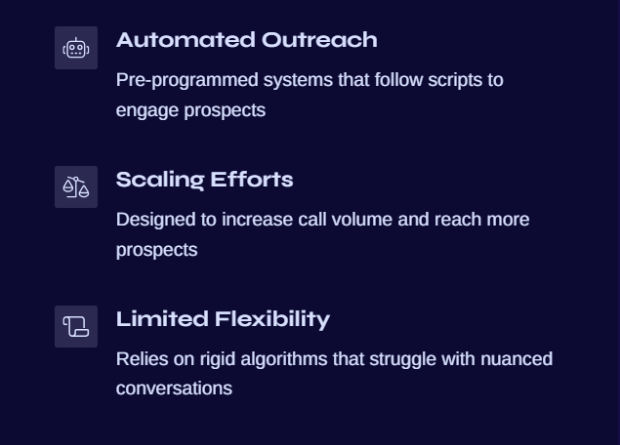Why AI Cold Calling Sucks (and What Actually Works)

How Customers Respond to Robotic Interactions
Customers can often tell when they are speaking to an AI system rather than a real person. This can lead to frustration or mistrust, especially if the interaction feels overly scripted or if the AI fails to respond meaningfully to specific questions.
Definition of AI Cold Calling
AI cold calling refers to the use of artificial intelligence tools to automate the process of making outbound calls to potential customers. These systems leverage pre-programmed scripts, speech recognition, and natural language processing to simulate a sales conversation. The goal is to save time and scale outreach efforts, but often at the cost of personalization and genuine human interaction.
Why Does AI Cold Calling Often Fail in B2B Sales?
Lack of Personal Touch in AI Cold Calls
Why Emotional Intelligence Matters in Sales Conversations
Human sales representatives bring empathy, intuition, and adaptability to the conversation—qualities that AI struggles to replicate. Emotional intelligence helps salespeople build rapport, understand the prospect’s unique pain points, and tailor their pitch accordingly.
Common AI Cold Calling Pitfalls
Overdependence on Scripts and Algorithms
AI cold calling systems rely heavily on pre-defined scripts and algorithms, which means they can struggle with nuanced conversations. This rigidity can result in missed opportunities to address objections or answer questions in real time.
Real-Life Examples of AI Cold Calling Gone Wrong
One common example of failure is when AI calls mispronounces names or fails to understand regional accents, leading to awkward or unprofessional interactions. Another frequent issue is the inability to navigate unexpected questions, causing the conversation to feel disjointed.

Rules and Regulations Regarding AI Cold Calling
What Laws Govern AI Cold Calling in the U.S.?
In the United States, AI cold calling is subject to the Telephone Consumer Protection Act (TCPA). This legislation prohibits the use of robocalls to mobile phones without prior consent from the recipient. Businesses must ensure their practices comply with these regulations to avoid hefty fines.
What Are the Penalties for Violating Robocall Regulations?
The Federal Communications Commission (FCC) enforces strict penalties for TCPA violations. Companies found guilty of unlawful robocalls can face fines of up to $16,000 per violation, as well as damage to their reputation.
How Can Businesses Stay Compliant?
Businesses can stay compliant by:
- Obtaining explicit written consent before calling prospects.
- Using opt-in mechanisms for customers to agree to automated calls.
- Maintaining updated Do Not Call (DNC) lists to ensure no calls are made to individuals who have opted out.
Are There Any Exceptions to These Regulations?
Certain exceptions exist, such as calls made for emergency purposes or those initiated by nonprofit organizations. However, businesses engaging in marketing or sales must adhere strictly to TCPA guidelines.
Why Do Some Businesses Still Use AI Cold Calling Despite Regulations?
While regulations are strict, some businesses attempt to use loopholes or operate in jurisdictions with less enforcement. However, this approach carries significant risks, including fines and reputational harm.
What’s the Alternative? How Can You Combine AI Tools with Human Expertise?
The Role of Hybrid Approaches in Cold Calling
How to Use AI for Data and Insights
AI tools excel at analyzing large datasets to identify high-value prospects and provide insights about their preferences. This information can be used to personalize cold calls, giving human sales reps an advantage before they even pick up the phone.
Adding Human Personalization to Outreach Efforts
By combining AI’s analytical capabilities with human emotional intelligence, businesses can create a hybrid approach. Sales reps can use AI-generated data to tailor their conversations, ensuring every call feels relevant and personalized.
Benefits of Combining Human and AI Efforts
Improved Engagement Rates with a Human Touch
Adding a human element to AI-driven insights results in more meaningful conversations, increasing the likelihood of engagement and conversion.
Building Long-Term Relationships with Prospects
Personalized interactions foster trust and loyalty, laying the foundation for long-term business relationships rather than one-off transactions.
How Can You Optimize Cold Calling to Achieve Better Results?
Tips for Effective B2B Cold Calling
Personalizing Scripts Based on Industry
Tailor your messaging to the specific needs and pain points of each industry. Research common challenges faced by businesses in your target market and address these directly in your pitch.
Active Listening as a Key to Building Rapport
Focus on truly listening to your prospect’s responses. Acknowledge their concerns, ask clarifying questions, and adjust your pitch based on the information they share.
Tools to Enhance Cold Calling Efficiency
AI-Driven Tools for Pre-Call Research
Leverage AI tools to gather valuable insights about your prospects, such as their recent business activities, interests, and pain points. This helps you craft a more targeted pitch.
CRM Platforms to Track and Improve Outreach
Customer relationship management (CRM) platforms can help track call outcomes, schedule follow-ups, and analyze performance metrics to refine your cold-calling strategy.
Is AI the Future of Cold Calling or Just a Passing Trend?
The Evolution of AI in Sales Outreach
AI is constantly evolving, offering new tools to improve efficiency and accuracy in sales outreach. However, its effectiveness depends on how it is implemented and integrated with human expertise.
As a reader, we’re sure you must’ve got an email like:
“Hey [first name] saw you work at [company] and I sell……”
Predictions for the Future: Will AI Replace Humans in B2B Sales?
The Balance Between Automation and Human Connection
While AI will continue to play a significant role in sales, it is unlikely to fully replace human interaction. The best results come from a balanced approach that leverages the strengths of both AI and human sales reps.
Why You Should Rethink Your Cold Calling Strategy Today (Conclusion)
AI cold calling has its limitations, particularly in building genuine connections with prospects. By combining the efficiency of AI tools with the empathy and adaptability of human salespeople, businesses can achieve better results.
Embrace a hybrid approach to cold calling that focuses on personalization, compliance with regulations, and the strategic use of AI insights. Ready to use ETHICAL cold calling as a part of your outreach strategy? Contact our team to learn more about solutions tailored to your business needs.
